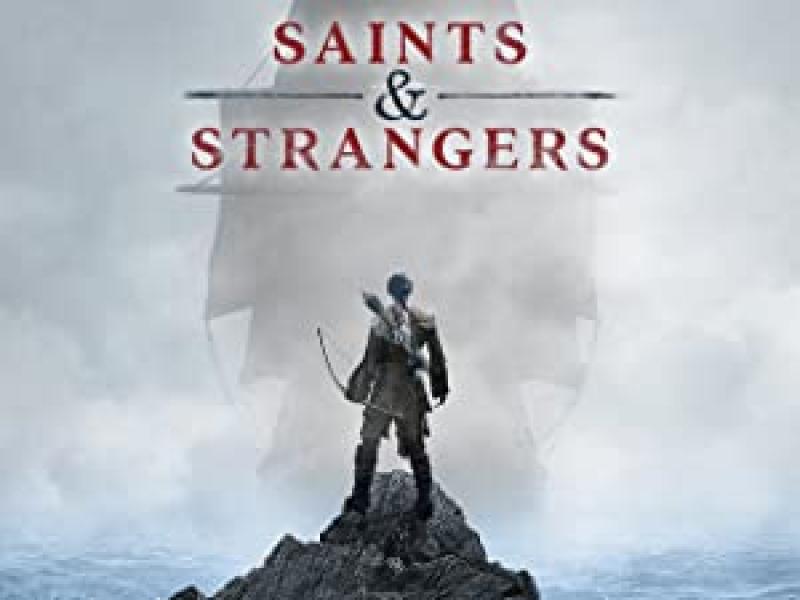Saints & Strangers
By: Amazon Prime
This year is the 400th anniversary of the Pilgrims' voyage to the New World (1620-2020).
With Thanksgiving coming this week, there's no better time to revisit this 2-part 2015 miniseries than the present.
The title Saints & Strangers comes from the Puritan separatists referring to themselves as 'Saints', while 'Stranger' was their word for the other people (not one of the separatists) who signed up to accompany them to the New World.
It was originally produced by National Geographic, but Amazon is the only place I could find it available for streaming at the moment.
It's such a shame that the pandemic has hampered the marking of the big anniversary at Plimoth Plantation (Plimoth-Patuxet). They even have a life-size recreation of the original Mayflower on display -- the Mayflower II.
For what it's worth, because of differences in the Julian and Gregorian calendars (Bradford only used the Julian calendar in his journal), yesterday (November 21st) was the actual anniversary of the Mayflower's landing at Provincetown Harbor, and the signing of the Mayflower Compact, the first democratically-based governing document produced by Europeans in the New World.
They wouldn't cross the bay and land at what would become Plymouth Colony for another month, and wouldn't actually start trying to build anything until the 4th or 5th of January, 1621.
Yup, January. Talk about poor planning. Fully half of them would die that first winter. If not for the Patuxet native Tisquantum (Squanto), they rest may not have survived the following year.
It's quite an amazing story, and a fixture of Colonial American lore.

[From Amazon Prime]
... Vincent Kartheiser (Mad Men), Anna Camp (Pitch Perfect) and Ron Livingston (Office Space) star in the acclaimed miniseries event Saints & Strangers, which dramatizes the Pilgrims' harrowing voyage and arrival to America. Loyalties are tested and hard-fought alliances become strained when the Pilgrims suspect a traitor in their midst.
PART 1 - November 21 2015 - 1h 36min - TV-NR - Subtitles
See the real story of the first Thanksgiving, revealing the struggles amongst the Plymouth settlers and the Native Americans, a story of survival, perseverance, dedication and commitment that reverberates throughout America today.
PART 2 - November 21 2015 - 1h 36min - TV-NR - Subtitles
Alliances are put to the test when a betrayal by the settlers leads to a broken agreement with the Pokanoket. Finding themselves again exposed, a new threat emerges for the Pilgrims as rumors spread that the natives are planning to attack.





Did anyone watch this miniseries back when it first aired? If so, did you like it? There doesn't seem to be many productions of this story to choose from, but I remember really enjoying this one.
I didn't see it in 2015 but I'll probably watch it this time around. My take may be a bit different than most that watch it.
I know there's NA angst around the Pilgrims and Thanksgiving, but at least the Pilgrims didn't come as conquerors. They'd been run out of England, and their religious views weren't welcomed much in Holland, either, so they were mostly just looking for a new place to live, away from persecution. Also, their settlement at Plymouth/Patuxet lacked a good deep water port, so it never grew into a gateway for further colonization like Boston did a bit farther north. For the most part, they just built their little village and lived there.
Hell, they'd probably seem like total religious nut jobs if we could meet them today, but their story, including that of Squanto and the other Native Americans in the area is still pretty darn interesting and engaging, at least to me. I've always been attracted to stories about people venturing off and starting over in new and far away lands.
The so-called ''peaceful Pilgrims'' massacred the Pequot Indians and destroyed their villages. I wonder if the series will show that?
Assuming you mean the 1637 attack on the Pequot fort on the Mystic river that ended the Pequot War, then, no, this show only goes to 1621, if I remember correctly.
I'm a little surprised to see the contempt in your post, Kav. Plymouth Colony was somewhat involved in the Pequot War (being in the area), but the main belligerents were the Pequot and Western Niantic tribes, against the Connecticut Colony, the Massachusetts Bay Colony, and the Narragansett and Mohegan tribes (on the side of the colonists).
From what I've read this evening (your post sent me investigating) the Mohegan especially despised the Pequot, and after the war had taken several of them as prisoners, but treated them so badly that the colonists eventually had to remove the surviving Pequot and set up a special reservation for them somewhere.
At any rate, that attack was not planned or led by anyone from Plymouth Colony. It was mostly a force from Connecticut Colony under Captain John Mason, with a small number of volunteers from the other colonies, and from what I just read here , the native Narragansetts and Mohegans who joined Mason in the attack outnumbered the colonists by more than 2 to 1.
It's not like the Pequot didn't kill anyone, either. They surrounded and isolated Saybrook Colony in 1636 and killed anyone they could find around it, and also repeatedly attacked other Connecticut towns throughout 1637, killing more.
They weren't exactly peaceful innocents, and they were enemies of other Native tribes, too, not just the colonists.
Only around half (50 or so) of the original Plymouth colonists (separatists and strangers alike) survived that first year. By 17 years later (when that attack occurred) more had died, and the rest were obviously 17 years older. I couldn't find the information anywhere, but it wouldn't surprise me if none of the original group from Plymouth (depicted in this show) were directly involved in it. But, as mentioned before, a whole lot of other Natives were.
I generally have contempt for stories that depict the colonists and or pilgrims/puritans as peaceful non-threatening good guys. The history of the New England area is one disease and wars basically concluding with King Phillips war.
So the Pequot weren't peaceful, the old standby used to excuse colonization. Of course, it's the Indian's fault that they fought to protect their land and peoples. I would assume that if a foreign power invaded the US that we would fight the invader, but Indians are not allowed that.
It is what it is Dig.
I have absolutely no problem acknowledging how much it sucks that Europeans essentially stole this continent from its original inhabitants. The thing is, I can't do anything about it. I can't change history.
But I can also acknowledge the fact that people have been fighting over territory and displacing other people for as long as there have been people. In Europe, Asia, Africa, the Middle East, you name it. And yes, even in the Americas before the Europeans ever showed up.
It's a hallmark of human history. It well and truly sucks. But, again, I can't do anything about it.
I didn't seed this particular show to spark any animosity or discontent. It's just an interesting story. It's always going to be an interesting story, about a small group of people hoping to build new lives in a new world. But a group of people who were basically bumbling fools — arriving right at the start of winter with not enough food, completely unprepared, with no knowledge of the local climate, and with almost none among them having what you might call 'country skills'. Being mostly town folk back in England, they weren't exactly farmers. They didn't even bring a plow, and those who survived the first winter very likely wouldn't have survived the next without the help of indigenous people in the area.
I mean, it's not just an interesting story, it's an friggin' awesome story. Especially if a person likes history.
But, you know what? If my seeding this has offended you, I will gladly remove it. You're one of my absolute favorite people here on NT, and I value you far, far more than this little seed. Just let me know. It doesn't look like anyone else is interested in it, anyway, so it's not like I'd be deleting anyone else's conversation but ours.
I do not want you to remove it, Dig. That is the last thing that I want. I just want people to understand that there are two sides to it. A side that is rarely known and historically inaccurate 99% of the time which of course is the Native side.
Even today the Wampanoag are fighting this administration for their land which the administration saw fit to take from them. A move by the Trump administration that shocked most legal observers. Currently, it is in limbo in the court system.
You are correct the Pilgrims were the early equivalent of the ''Clown Car''
Friends can have very different views on any given subject, it does not mean that they are no longer friends.
Baamaapii niijii (until later my friend)